Presidents 40-42
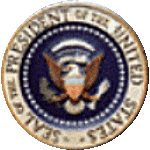

Ronald Reagan
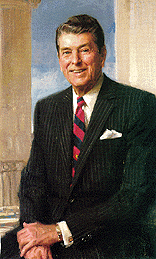
"Government is not the solution to our problem; government is the
problem," said President Ronald Reagan. Reagan, one of the most
conservative presidents of the 1900s, emphasized the traditional values of
family, patriotism, and hard work. As President, he tried to cut back on
federal taxes and regulations in the belief that they hindered economic
growth.
Ronald Wilson Reagan was born in Tampico, Illinois, but spent most of his
childhood in Dixon, Illinois. He majored in sociology and economics in
college, but was more interested in sports and extracurricular activities.
From 1932 to 1937, he worked as a radio sports announcer, but he already had
his eye on Hollywood.
In 1937, Reagan got a screen test and then a seven-year contract with Warner
Brothers Studio. He made more than 50 films in his career, and served as
president of the Screen Actors Guild from 1947 to 1952 and from 1959 to 1960.
Reagan also took an active part in national politics. He was an experienced
speech-maker who spoke on behalf of many candidates and developed a clear,
conservative message over the years. In 1966, he was asked to run for governor
of California. Reagan accepted the offer and won the election. He was
reelected in 1970. As governor, Reagan eliminated the state's budget deficit
and reformed the state's welfare system.
In 1976, Reagan challenged President Ford for the presidential nomination of
the Republican Party and almost won. In 1980, he did win the nomination, and
campaigned against President Carter by asking voters, "Are you better off
than you were four years ago?" Reagan won by a landslide and, at age 69,
became the oldest person ever to become President.
Reagan's presidency was almost cut short when he was shot on March 30, 1981,
by John Hinckley, Jr., a man later judged to be insane. Although a bullet
punctured a lung and lodged near his heart, Reagan made a remarkable recovery.
He was back in the White House 12 days after the shooting.
Reagan proved to be very successful at mustering support for his programs. His
sincerity and charm made Reagan a popular President and earned him the
nickname "The Great Communicator."
"Reaganomics" was the name given to his administrations package of
tax, spending, and regulatory changes. Reagan signed the largest tax cut in
American history in 1981. He also dramatically increased defense spending
while cutting spending for social programs. Many government regulations were
cut in such areas as pollution control and in the savings and loan industry.
The results of Reagan's programs were mixed. In 1982, the economy began the
longest period of expansion since World War II. Growth remained strong into
Reagan's second term. But the additional defense spending pushed the budget
deficit to record levels. The national debt more than doubled under Reagan,
and the United States went from being the world's largest creditor nation to
its largest debtor nation.
Still, with the economy booming, Reagan easily beat Democrat Walter Mondale in
the 1984 presidential race. Reagan's second term was clouded by the
Iran-Contra Scandal. In 1985, the White House agreed to sell arms to Iran.
Some of the money from the secret arms sale was secretly sent to the Contras,
rebels fighting against the socialist government in Nicaragua. This was in
violation of a law recently passed by Congress. Congressional hearings
revealed that Reagan's staff had undertaken these secret operations without
the President's knowledge.
After his second term, Reagan retired to his ranch in California.
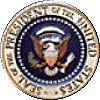
George H.W. Bush
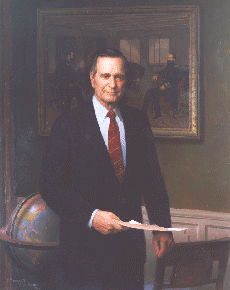
On January 17, 1991, President Bush launched Operation Desert Storm, a
military offensive against Iraq. When the Gulf War ended, the Iraqi army had
been shattered. George Bush's approval rating shot to 89 percent, the highest
ever recorded in the history of the Gallup Poll. Bush's decisive and forceful
military actions were one of the hallmarks of his presidency.
George Herbert Walker Bush was born in Milton, Massachusetts, but grew up in
Greenwich, Connecticut. His father was a successful banker and later became a
senator. Bush enrolled in the navy during World War II and, at age 18, became
the navy's youngest commissioned pilot. In his 58 combat missions, he had more
than one close brush with death. He earned the Distinguished Flying Cross.
After the war, Bush studied economics at Yale and then moved to Texas to enter
the oil business. Hard work, good judgment, and luck eventually made him a
millionaire.
Bush became interested in Republican politics in the 1950s. He brought to
politics the same hard-working, competitive spirit that had brought him
success in business. In 1966, he was elected to Congress and was reelected two
years later. In 1970, he ran for the Senate and lost. President Nixon then
appointed him ambassador to the United Nations. President Ford named Bush as
his representative to China, and later made him head of the Central
Intelligence Agency.
Bush sought the Republican presidential nomination in 1980, but was defeated
by Ronald Reagan. However, Reagan chose Bush as his running mate, and Bush
served as Vice President for eight years. In 1988, Bush beat Democrat Michael
Dukakis to win the White House. He promised to carry on Reagan's conservative
policies.
Bush's domestic options were limited by a huge budget deficit. To add to the
problem, Reagan and Congress's deregulation of the savings and loan industry
had created a financial disaster that Bush inherited. Hundreds of savings and
loan institutions failed, leaving the government to repay insured depositors.
Bush signed a bailout bill that will cost taxpayers hundreds of billions of
dollars over time.
Bush was more successful in foreign policy. In December 1989, Bush ordered
American forces to invade Panama and arrest dictator Manuel Noriega, who was
wanted in the United States on drug trafficking charges. Noriega was captured,
tried, convicted, and sentenced to 40 years in prison. Many nations condemned
Bush's action as a return to "gunboat diplomacy." But the invasion
was enormously popular in Panama, where most people hated Noriega.
Bush's greatest triumph was in leading the coalition of nations that repelled
Iraq's invasion of Kuwait. After the Iraqis captured Kuwait in August 1990,
Bush used his diplomatic skills to isolate Iraqi dictator Saddam Hussein, and
to obtain resolutions from the United Nations condemning Iraq. He created a
coalition that included the United States, Great Britain, France, Italy,
Canada, Saudi Arabia, Egypt, Syria, and other nations. After several weeks of
attacking Iraqi forces from the air, the Allies launched a ground offensive
from Saudi Arabia that steamrolled over the battered Iraqi forces.
But Bush's victory and new popularity did not guarantee him a reelection
victory. With the economy in recession in 1992, Bush found himself in an
uphill race against Democrat Bill Clinton and independent Ross Perot. Clinton
won the election .
George Bush continues to be an elder statesman of the Republican party.

William (Bill) J. Clinton
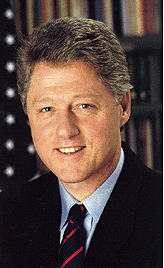
Campaigning for the presidency, William Jefferson "Bill" Clinton
promised to be the candidate of change. He pledged to deliver the nation from
Republican economics, to reduce the deficit, to reform the welfare system, and
to improve the nation's health care system.
Bill Clinton was born in Hope, Arkansas. He grew up in Hope and in Hot
Springs, Arkansas. An exceptional student, Clinton won a Rhodes Scholarship
and studied in Oxford, England. He earned a law degree from Yale University.
Clinton became interested in politics at an early age, and he ran for Congress
-- although unsuccessfully -- only a year after graduating from law school. In
1976, he became Arkansas's attorney general. In 1979, he won the governorship.
As governor, Clinton improved the state's school system, but angered business
owners and taxpayers by raising state gasoline taxes. Defeated in his
reelection bid, Clinton claimed to have learned from his mistakes. He was
reelected governor in 1982, and served until he was elected President.
Beating five other candidates in the Democratic primary race, Clinton won the
party's presidential nomination in 1992. For his running mate, Clinton chose
Albert Gore. Clinton (age 46) and Gore (age 44) were the youngest presidential
ticket ever to run.
The 1992 election was unusual. Ross Perot, a Texas billionaire, emerged as the
strongest third party candidate since Theodore Roosevelt created the Bull
Moose Party. At one time, Perot even ranked higher in the polls than Bush or
Clinton. But Perot weakened his candidacy by dropping out and then reentering
the race. Clinton emerged as the front-runner, and kept his lead right up to
the election.
Clinton is an outgoing President who enjoys campaigning and talking with
voters. As a political leader, he favors compromise and consensus over
conflict and confrontation. Supporters claim that Clinton may vary his methods
but that his goals remain the same. Critics charge that he is too anxious to
please, and that he tries to be all things to all people.
Clinton failed to achieve his most important goal of reforming the health care
system. Clinton presented his health care system to Congress in 1993, but it
failed to pass. He claimed the Republicans and special interest groups blocked
the plan, which would have guaranteed affordable health care to every
American. Critics of the President claim his plan would have been too
complicated, too inefficient, and too expensive.
In 1994, the Republicans made such gains in the November elections that they
achieved majorities in both houses of Congress for the first time in forty
years. Speaker of the House Newt Gingrich became the most influential voice in
the Republican party. Gingrich had his own plans for Congress. Clinton has
shown some willingness to work with the Republican Congress. But his ability
to achieve his own goals and set the national agenda has been severely
reduced.

All images of Presidents are courtesy of whitehouse.gov
Information taken from Software titled "American Heritage The History of
the United States for Young People.
The copyright belongs to: Forbes
Inc. and Byron Preiss Multimedia Company. Thank You!



|